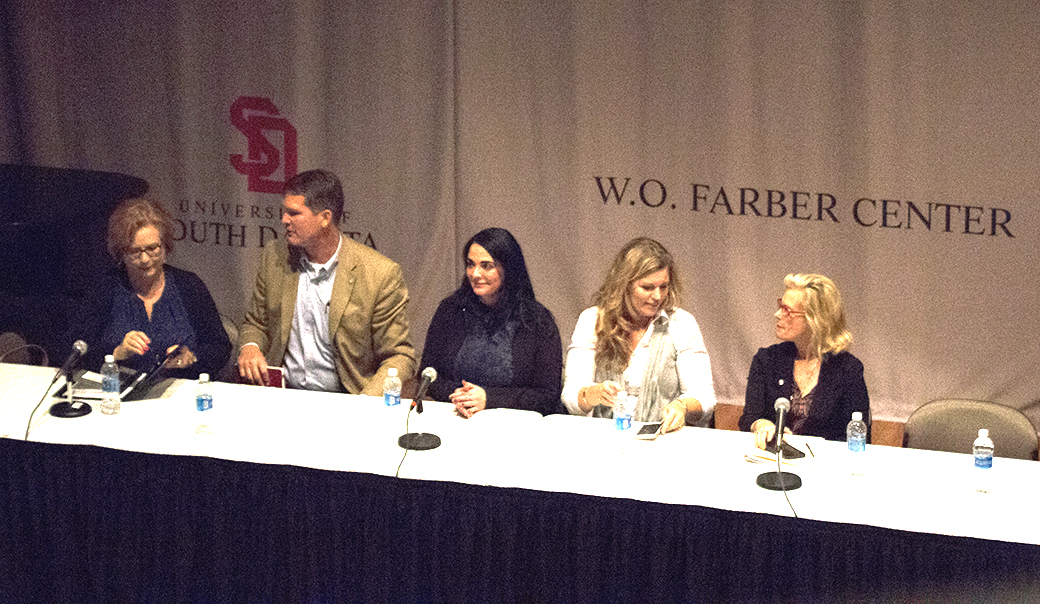
Town hall: Students voice concerns, ask questions about sexual assault policies
Students and faculty had an open discussion on sexual assault awareness Monday evening.
About 120 students, faculty and community members gathered at a town hall meeting in Farber Hall.
Attendees were allowed to ask questions and give feedback about their concerns to a panel.
The panel included: Tena Haraldson, director of communications; David Herbster, athletic director; Khara Iverson, director of equal employment opportunity and chief Title IX officer; Debra Robertson, coordinator of mental health services and Kim Grieve, dean of students and vice president of student services.
Discussion included how USD handles sexual assault cases, how the Title IX training can be improved and what the ICARE grant entails.
Krista Honomichl, a sophomore criminal justice and political science double major, said the town hall was a step in the right direction.
“It gave students and faculty an opportunity to express their concerns, ask questions, get some clarification,” Honomichl said. “However, I feel like there’s a lot more to go in this conversation. We can’t just end here. This is an ongoing conversation. If we want to effect change, we’re going to have to continue talking about this and really start to implement what policies and ideas have been suggested.”
Student concerns were centered around training methods, who receives the training and how to make sure everyone completes the training.
Haraldson urged for suggestions from students as to how training could be improved.
“One of the reasons that we’re here tonight is to hear suggestions, and obviously you’re an important group because you’re the students that we’re working with,” Haraldson said. “We would like to hear from you, what you think is better or what you would prefer to have for training.”
Some suggestions brought forward included not letting students move in unless they’ve taken the training and calling for administration to work with organizations like Students for Reproductive Rights, PAVE-USD and the Student Government Association.
Diedra Gatzke, a junior accounting major, said they think it would be good to make this information available to students.
“A lot of students get annoyed with the mandatory programming at the beginning of the year, but otherwise if the information is just available, a lot of students don’t think to look for it,” Gatzke said. “Which is really a shame, but it’s what happens. So I think that we should just kind of make this more visible to students and just push on them a little more, very kindly, but just a little bit more.”
Grieve said next year’s training will look a lot different because of programming through the ICARE grant.
Bridget Diamond-Welch, an associate professor of political science and director of the ICARE grant, was in attendance and gave a breakdown of the strategic plan.
“We have different teams and they all have basic goals,” Diamond-Welch said from the crowd. “We have a law enforcement team, we have a student conduct team, a prevention team, bystander training, assessment, which is a campus climate study, and getting it up to 100 percent, advocacy and there are other teams as well and each of them has many, many goals.”
Honomichl, vice president of Students for Reproductive Rights, said she liked learning about that plan.
“As part of Students for Reproductive Rights, we have been trying to kind of fight this on campus, but until tonight, we haven’t gotten a very specific outline of what the strategic plan would do from the administration members,” Honomichl said. “It makes me feel like the university is now actually making steps versus just that they are implementing a few plans (that) they never really talked about.”
She said having a conversation about these issues is important because people tend to be quiet about them.
“We like to pretend like these things don’t happen,” she said. “However, until we start having the conversation, things aren’t going to be done. I feel like as an individual, just that it’s my duty to help make sure that these things are going to be fought, and that people know that there are people out there that care and are doing what they can to make change.”

